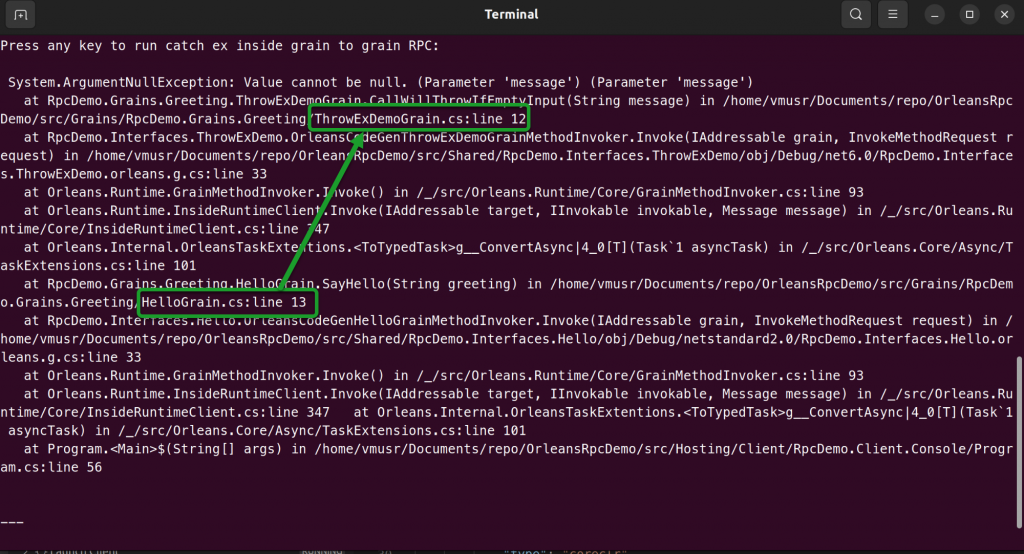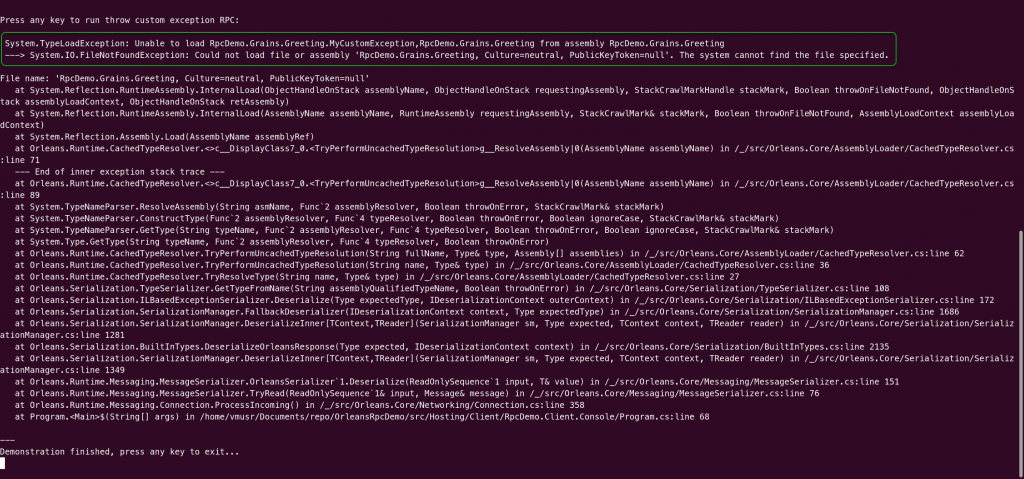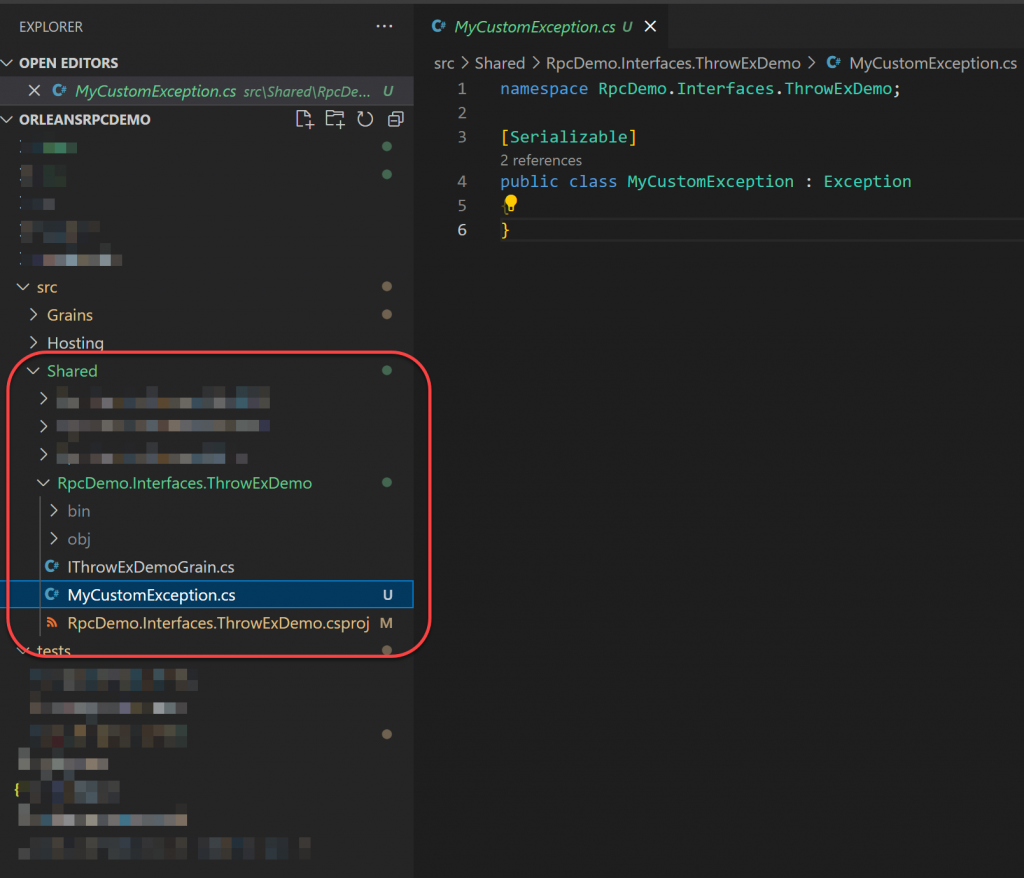Grain的RPC方法可以拋出例外,如下範例:
public Task<string> CallWillThrowIfEmptyInput(string message)
{
if (string.IsNullOrEmpty(message))
{
throw new ArgumentNullException(nameof(message));
}
return Task.FromResult(message);
}
而在呼叫端,無論是使用 IClusterClient 的客戶端程式還是由另一個Grain用 GrainFactory 屬性取得的RPC呼叫實體,都可以使用標準的 C# try...catch 語法來捕捉例外:
try
{
var throwDemoGrain = client.GetGrain<IThrowExDemoGrain>(0);
_ = await throwDemoGrain.CallWillThrowIfEmptyInput(string.Empty);
}
catch (Exception e)
{
System.WriteLine(e);
}
即使拋出例外的位置是當Grain去呼叫另一個Grain的RPC方法時,在最初始RPC呼叫的客戶端也可以正常捕捉到例外(假設呼叫另一個Grain的RPC之Grain內部實作沒捕捉例外的話),而且可藉由執行堆疊(Stacktrace)紀錄來查找例外觸發的執行路徑:
在設計例外處理的架構時有一點要注意,例外的類別必須是在Client端可解析的,否則會在擲回例外給Client端時發生錯誤,如下圖:
解決方法:將例外的類別定義原始碼放在Client端也會加入專案對專案參考的類別專案中,如RPC介面的專案,並將該例外類別加上 [Serializable] 屬性。
RPC方法如果有定義 CancellationToken 輸入參數,並且在實作內容上有根據該參數的值來判斷是否要取消執行,就可以在呼叫端使用 CancellationTokenSource 來取消呼叫:
//RPC方法定義
public interface ILongJobGrain : IGrainWithStringKey
{
public Task<string>? ProcessString(string input, CancellationToken cancellationToken);
}
//Grain實作
public Task<string>? ProcessString(string input, CancellationToken cancellationToken)
{
if (cancellationToken.IsCancellationRequested)
{
_logger.LogInformation("Cancellation requested");
throw new OperationCanceledException();
}
// Pretend to do some work
var i = 0;
var result = string.Empty;
while (!cancellationToken.IsCancellationRequested)
{
_logger.LogInformation("i = {i}", i);
i++;
Task.Delay(1000, cancellationToken).Wait(cancellationToken);
if (i > 20)
{
result = $"{input} done";
break;
}
}
if (cancellationToken.IsCancellationRequested)
{
_logger.LogInformation("Cancellation requested");
throw new OperationCanceledException();
}
// Result gets sent back to the caller
return Task.FromResult(result);
}
但實際上跑起來會發現這個方法只有在Silo內被其他Grain實體呼叫的情況下會有效,如果是在Client端呼叫Grain的RPC方法,則無法正常取消,因為Client端的呼叫是透過Grain的代理來呼叫,而Grain的代理是在Client端的AppDomain中,而非Silo內的AppDomain中,所以在Silo內的Grain實作中,是無法正常取得Client端的CancellationToken的值,因此無法正常取消呼叫。
官方有提供一個 GrainCancellationToken 類別的替代標準C#的 CancellationToken,但 不建議使用,而且一樣沒有辦法由Client端遠端要求取消Silo端的Grain RPC方法執行。
建議使用的設計架構是將呼叫方法多包裝設計成由一個ProxyGrain來呼叫,而ProxyGrain再呼叫真正的Grain實作,如下範例:
using Orleans;
using Orleans.Concurrency;
//Proxy方法定義
public interface ILongJobProxy : IGrainWithStringKey
{
Task StartAsync(string input);
Task<string> GetResultAsync();
[AlwaysInterleave]
Task CancelAsync();
}
//ProxyGrain定義
[Reentrant]
public class LongJobProxy : Grain, ILongJobProxy
{
private GrainCancellationTokenSource? tokenSource;
private Task<string>? processStringTask = null;
private ILongJobGrain? grain;
public Task StartAsync(string input)
{
tokenSource = new GrainCancellationTokenSource();
grain = GrainFactory.GetGrain<ILongJobGrain>(this.GetPrimaryKeyString());
processStringTask = grain.ProcessString(input, tokenSource.Token.CancellationToken);
return Task.CompletedTask;
}
public async Task<string> GetResultAsync()
{
if (processStringTask is null)
{
throw new InvalidOperationException("StartAsync must be called before GetResultAsync");
}
return await processStringTask;
}
public async Task CancelAsync()
{
if(tokenSource is null)
{
throw new InvalidOperationException("StartAsync must be called before CancelAsync");
}
if(tokenSource.IsCancellationRequested)
{
_logger.LogWarning("CancelAsync called but cancellation has already been requested");
}
await tokenSource.Cancel();
}
}
這在RPC方法定義中,用來取消執行方法的 CancelAsync() 加掛的 [AlwaysInterleave] 屬性,是用來告訴Orleans這個方法可以被同時多個來源呼叫的,因為有可能網路或是Silo正重新載入Grain等問題導致單次呼叫 CancelAsync() 時,Silo端的Grain沒有收到,所以在架構設計上要能夠多次呼叫 CancelAsync() 確保Silo端的Grain能收到取消請求。
而為了要讓該方法的實作的確可以同時被多次呼叫,需要在實作RPC方法的Grain類別上加掛 [Reentrant] 屬性,宣告該Grain可以 "重新進入(Reentrant)" :讓該Grain的RPC方法可以不必約束於原本的Actor模型定義,可以在grain正在執行中一個RPC方法時,容許有 [AlwaysInterleave] 屬性的RPC方法也可被呼叫而不需等前一個RPC方法結束執行。
在命令列的Client端程式呼叫時就可以寫成這樣,在呼叫RPC方法之後,可按Ctrl+C來取消執行:
var longJobProxy = client.GetGrain<ILongJobProxy>("job_proxy");
Console.CancelKeyPress += async (source, args) =>
{
args.Cancel = true;
WriteLine("Cancelling ProcessString()...");
await longJobProxy.CancelAsync();
};
Console.WriteLine("Start ProcessString()..., press Ctrl+C to cancel");
try
{
await longJobProxy.StartAsync("long job demo");
var longJobResult = await longJobProxy.GetResultAsync();
Console.WriteLine($"Call LongJobGrain.ProcessString(\"Cancellable RPC Demo\") = {longJobResult}");
}
catch (Exception e)
{
//RPC method cancelled
WriteLine(e);
}
此範例程式GitHub專案在:
https://github.com/windperson/OrleansRpcDemo/tree/day15
明天繼續討論Reentrant的用途,包括如何解決Grain RPC呼叫的死結問題。
